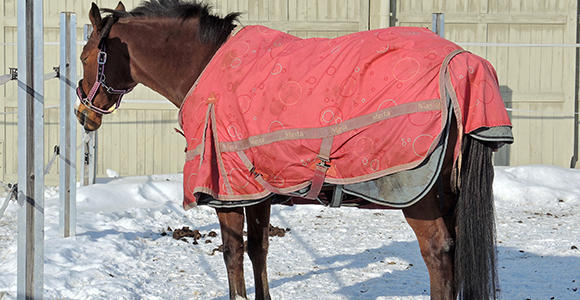
Section Branding
Header Content
Horses, Cows, Cats and Dogs: Protect Your Animals From The Bitter Cold
Primary Content

Since animals have fur, we assume they don't need protection from single digit temperatures. They do! Plus the protective measures are easy to implement. Georgia’s Department of Agriculture offers these tips on how to protect your animals from frigid weather - whether they are horses, cows, cats or dogs. Here they are:
For Horses:
”Horses will start growing winter coats when there are fewer than 12 hours of daylight. They remain healthier if they stay outside, and healthy horses can tolerate cold temperatures if they have adequate hay, grain and water. In cold weather, horses require more calories. However, they can get impaction colic if they don’t drink enough water on cold days. To combat that, sprinkle salt in their feed. This, along with Gatorade in their water, will encourage water consumption – just make sure water is always available at feeding time and any ice in it is broken. Occasionally, ice will form on a horse’s back, which actually helps them retain heat. For old, skinny horses, offer adequate shelter or a winter blanket and additional care to help them stay warm”.
For Cattle
"In October of 2013, approximately 100,000 cattle died due to exposure by an extreme blizzard in South Dakota, costing that state as much as $1.25 million. Although Georgia does not experience such extreme changes in temperature, recognizing good management of cattle due to intense fluctuations in temperature is always a good idea".
"Beef cows exposed to cold stress require more energy for maintenance. Cold stress occurs when the wind, temperature and humidity affect bovines’ critical temperature. If a farm has woods, hills or other types of shelter, this can provide some protection against the wind. Once a bovine reaches its lowest critical temperature, it begins to shiver, which requires more energy to maintain internal body temperature".
"Try to reduce mud in and around feeding areas. This can reduce energy stores and internal body temperature, especially for calves".
"The best and easiest way to manage a winter feeding regime is to know how to monitor cattle’s body conditions. Forage should be tested for its true nutritional composition. If hay doesn’t provide a sufficient amount of energy, then cattle need to be supplemented with another form of energy-dense ration. Keep a mineral supplement, especially with magnesium, in an effort to reduce grass tetany, which can be triggered in cold weather".
Cats And Dogs
"Small pets, especially young and geriatric ones, should be kept indoors. Long-haired breeds such as Huskies will do better outdoors than short-haired breeds such as Dachshunds. Though there are stylish dog sweaters and raincoats available, be aware that most heat loss occurs from ears, the respiratory tract and foot pads. If there is ice on the ground, wash dogs’ feet with a wash cloth. Rock salt or chemical ice melts can cause foot pads to get chapped and raw, and excessive licking of it can cause digestive problems".
"Make sure there is plentiful food and water. Pets with pre-existing conditions such as cardiac disease, kidney insufficiency, diabetes and hormone imbalances will have more difficulty regulating body temperatures".
"There are also other hazards that come along with cold weather to consider. Cats will hide anywhere to stay warm, including under the car hood. If you park outdoors, tap your hood to scare away felines that might be hiding there. They can get seriously hurt or killed by moving engine parts. Antifreeze; if left out, is poisonous to dogs and is sweet to the taste. Some manufacturers have now added a bitter ingredient to make it less appealing, but none the less it should be disposed of properly".





